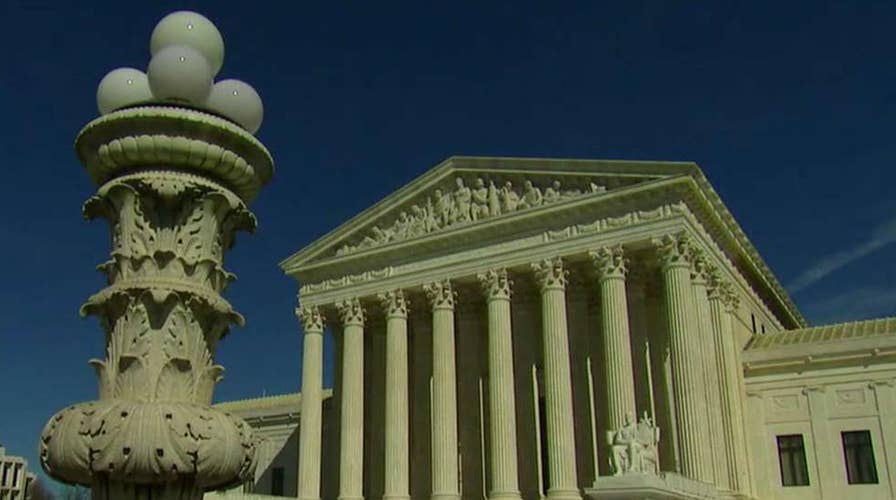Abortion case could have wide-ranging implications
Supreme Court justices weigh whether pro-life pregnancy centers can be required to give out information about the availability of abortions; 'Fox News @ Night' anchor Shannon Bream reports.
Tuesday’s 5-4 Supreme Court decision overturning a California law that required pro-life pregnancy centers to provide women with information about abortion is a victory for the First Amendment, for women seeking support during their pregnancies, and for the pregnancy centers.
The decision came in the case of National Institute of Family and Life Advocates (NIFLA) v. Becerra.
Every pregnancy is tough. Pregnancy without sufficient support, financial or emotional, can seem impossible. Every year, pregnancy centers across the United States offer a helping hand to thousands of women so that they can confidently choose life for their babies.
These centers provide women personalized attention and care during and after pregnancy, free of charge. Many offer pregnancy tests, ultrasounds, prenatal education and classes on parenting. They also offer tangible support like maternity and baby clothes, diapers and wipes, and even strollers and car seats to lighten the financial burden of caring for a newborn.
But the most important service found at a pregnancy center is caring. When walking through the doors of a pregnancy center, women find the kind of care and attention that reinforces their dignity as women and helps them prepare to become mothers.
Rather than celebrate the work of these nonprofit centers, California tried to impede it. Through California’s Freedom, Accountability, Comprehensive Care and Transparency Act – commonly known as the Reproductive FACT Act – the state targeted pro-life pregnancy centers and forced them to direct women towards abortion, the state’s preferred response to an unexpected pregnancy.
Under the California law, pregnancy centers were required to notify their clients about the state’s free or low-cost family planning programs, which include abortion services. Centers that failed or refused to become abortion-promoting billboards were subject to cumulative fines.
But something got in the way of the California law: the First Amendment of the Constitution.
The First Amendment’s guarantee of free speech includes the right not to be forced by the government to speak. California’s FACT Act did just that, by requiring pro-life pregnancy centers to promote the state’s family planning programs, which include abortion.
As Supreme Court Justice Clarence Thomas, who wrote the majority opinion in the NIFLA case, forcefully stated: “California cannot co-opt (pregnancy centers) to deliver its message for it.” The government can’t force people to promote an idea they oppose, like the notion that abortion is the solution to a challenging pregnancy.
The Supreme Court’s decision to strike down California’s law vindicates the First Amendment’s prohibition on compelled speech. But more importantly, it vindicates women and the pregnancy centers who help them.
California’s FACT Act was just one example of a troubling trend of cities and states targeting pro-life pregnancy centers.
An amicus brief filed by the Catholic Association in the NIFLA case on behalf of 13 clients of pregnancy centers recounts the experiences of these women and their unwavering opposition to attempts to force centers to promote abortion or shutter their doors. Each woman felt challenged by the circumstances she faced and turned to her local pregnancy center for support.
The unique needs and concerns of these women were heard and responded to with genuine compassion by pregnancy center staff.
As Melissa, one of the 13 women who courageously came forward to share her story, remarked: “I feel like every woman who walks through those doors gets the same treatment – open, loving, very warm – especially if you don’t have any other supports.”
At pregnancy centers, these women were offered an authentic choice and the chance to flourish and thrive as mothers, despite their circumstances.
Laura chose to carry her pregnancy to term even though it meant losing the relationship with her child’s father. A pregnancy center eased the financial burden by offering free diapers and wipes, and the center’s counseling services helped Laura recover from the emotional abuse of her prior relationship.
Angela faced a different challenge. Alone and addicted to drugs, Angela reached out to center staff to help her stay clean for the sake of her developing child. Angela’s son, now a precocious 2-year-old, is the apple of his mother’s eye. Angela still receives counseling and support as she raises her son and prepares to enter the workforce.
One woman, Melissa, when asked to respond to the charge that pregnancy centers are deceptive, flatly retorted that such a claim is “bogus.” Another, Judith, said that she wants to “shout from the rooftops” that there are places to go for women who chose abortion to heal from their grief.
These women – and countless others across the country – are unequivocal in their gratitude for the life-affirming care and support they found at their local pregnancy centers. That these centers can operate, safeguarded by the Constitution from attempts to undermine their profoundly pro-woman message, is a great win for women everywhere.

